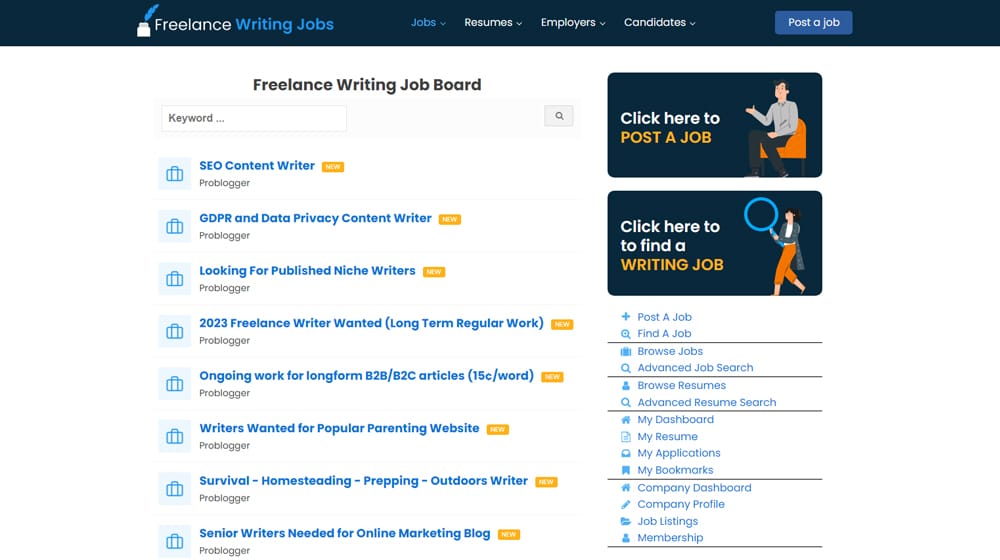Fitness is a multi-billion-dollar industry, so it's no surprise that many people want to get a piece of that pie. Running a successful fitness blog can be a great way to take part in the industry, help people with their personal goals, and improve your own lifestyle.
Of course, dedicating yourself to fitness leaves little time in the day for things like content writing, research, and marketing. Many of the best fitness blogs, even those that appear to be written by the gurus themselves, are ghostwritten by talented blog writers.
 You, too, can hire a ghostwriter to write your fitness blog for you. The only question is how!
You, too, can hire a ghostwriter to write your fitness blog for you. The only question is how!Fitness and exercise is a massive industry full of sub-niches and sub-sub-niches that, themselves, can make up entire websites. Consider that all of these are part of the fitness and exercise niche:
While all of these are forms of fitness and exercise (sometimes with a little extra thrown in), they require a different mindset, perspective, and set of tips and information to be successful. Your chosen fitness and exercise writer needs to have a strong foundation in that particular kind of fitness, so they aren't waffling about its benefits or tempering their claims when they create content for you.

You'll also want to determine what kind of blog you want to be. Are you giving tips in general, along with a bunch of motivational encouragement and calls to action to sell your personal training services? Are you provided detailed exercise plans for people to follow, take it or leave it? Are you more of a lifestyle blogger showing off your own personal journey with some tips for others to replicate your success? Again, all of these have differences in how the writer will need to portray and convey your information.
By pinning down all of these details ahead of time, you know what you need, so you know what to ask writers if they can provide.
Another thing you'll want to do is determine the technical needs you'll have from your writer. The scope and scale of your project will determine who you should look for and what kind of relationship you want to have.
There's a world of difference between:
All of these are potentially things you might want to do. But, different writers specialize in different kinds of writing. The fitness blogger might not be comfortable with longer eBook forms or script writing. The scriptwriter might not be able to write a course or won't have long-term availability for an ongoing blog. By knowing what you want out of your writer, you know how to pitch your job, and they know whether or not they can take it on.

Another choice you need to make here is how much work you'll be doing along the way. Sometimes, you can just tell a fitness writer that you want a blog post about leg presses, and they'll deliver something great. Other times, you'll need to pin down a specific exercise plan you want them to write about and give them a content brief with the salient details.
The more your writer can write independently, the better off you'll be; however, they'll likely be more expensive because of that skill. Know your needs, and be prepared to negotiate.
You may also need to find writers who are familiar with Google's YMYL algorithms. YMYL stands for Your Money or Your Life and is a set of stricter rules that apply to sites that deal with anything that can significantly impact finances and health. Exercise and fitness straddles that line; it's adjacent to health but isn't quite so heavily regulated as actual medical information and health. Knowing where that line is and what kinds of claims can safely be made is an important skill for fitness writers in this industry.
Once you know what you need, you can develop a pitch and/or a job listing that pins down the most important details. This can then be used either to pitch to specific writers or to post as a job opening on job boards to let interested writers apply.
If you want to go out and find a fitness writer, great! You can visit sites like Upwork, Freelancer, or individual writer websites to look for skilled writers to approach. These sites allow writers to create profiles that list their skills and areas of expertise, including experience levels with various industries. You can search for writers who specialize in fitness or even in your specific subsection of fitness and approach them with your project.
This method is slow, but if you're good at finding the right kinds of writers, you can get your dream writer right off the bat. However, you risk wasting time if the writer you pitch doesn't want anything to do with you, wants to charge more than you're willing to pay, or simply has no availability in their current schedule.
The second option is to let writers come to you. You can use sites like Problogger, Flexjobs, or my site here to post your job opportunity on a public board where writers can see it. They can apply with their portfolios, samples of their work, and their experience levels. You can then filter through the applications, pick out the most promising candidates, and see if they're acceptable to work with.

The filtering, interviewing, and testing process here can be much more intensive than it is with searching for freelancers individually, but the initial phase of the process is more passive. You may also miss out on some of the best writers who no longer have a need to go find clients because clients come to them.
Neither option is necessarily better than the other for exercise and fitness blogging; there are plenty of writers willing to work in the niche or specialize in your content; you just need to find them.
One thing to note is that some niches of fitness may need someone with a bit more expertise or familiarity to write about them properly. For example, if your fitness blog digs deep into the biokinetics and mechanics of how exercises work and how the biology behind fitness functions, you may want to find a writer with a deeper level of familiarity with these subjects. You might even find writers with their own degrees in health and fitness, like sports medicine. They'll be harder to find and charge premium rates for their expertise, but it's well worth it in the end.
The third option is to hire an agency. Agencies are the most expensive option, but they do everything for you, so you can sit back and run your blog's business face, handle your courses and training, and do everything else with your full attention, knowing that your blog is handled. That choice is entirely yours.
Once you've created a shortlist of writers – whether you went out to find them or you posted a job, and they found you – you want to test them. Even experienced writers are generally okay with test projects. After all, they're testing how well they can work with you just as much as you're testing them. Either side is free to call off the project at any point.
Pro tip: make sure you pay for your test projects. Writers are often taken advantage of by companies looking for "test" content that they don't pay for, but they then go ahead and use it on their site after ghosting the writer. Since most writers don't have a lot of income, the prospect of hiring a lawyer to deal with this kind of dishonesty is daunting. Paying for a test project, even if it's lower than your full rate, is going to alleviate many of these fears.
Testing and evaluating writers comes down to a few different ways of looking at a project.
First, you want to develop a test assignment that is as close to a real project as possible, whether that's a single blog post, a chapter from an eBook, a course or video script, or something else entirely. Develop your content brief and style guide, give the writer a deadline, and see how they perform.
At this point, you want to see how well the writer communicates with you. Do they ask clarifying questions? Do they respond appropriately when you message them? Are they terse and off-putting? Initial impressions can be important here.

Once the writer completes the test project, you can evaluate it in several phases.
The first phase is in their behavior. Did they turn it in ahead of time? Did they need a deadline extension? How do they communicate?
The second phase is the initial read-through of the content. Does it have the right tone and voice? Does it meet your content requirements? Does it cover all of the bullet points you wanted it to cover and display expertise with a clear source of authority? Does it have any typos or grammatical errors?
You can also run the content through various online checks. Copyscape can tell you if any of the content is plagiarized from somewhere else. Grammarly can point out issues and errors in the writing. Other checks can look into style and reading level. Watch for red flags and inconsistencies.
The third phase is a deeper read-through of the content. Does it have the appropriate logical flow and order to the content? Does it fit in with the other kinds of content you've written in the past? Does it include any links or calls to action you might want it to have? Does it anticipate reader questions and attempt to answer them? Does it adhere to the brief?
You may be evaluating multiple competing pieces of writing on the same subject, depending on how you've chosen to approach hiring a writer. Pick the best combination of great content, easy-to-work-with writers, and attention to detail.
Once you've chosen the writer you'd like to work with, you have a few things left to do.
The first is to decide what kind of relationship you want with this fitness writer. Most writers are fine with a standard freelance contract; you agree to pay them for their work, and they agree to write that work and sell the rights to you. There's more to these contracts than just that, but that's a topic I covered elsewhere.
Alternatively, you could offer them more traditional W-2 employment. This has different tax and relationship implications and even a different pay structure. Some writers would leap at the chance, while others might not want to tie themselves down.

Either way, getting a contract written up and signed is an important part of the process. Contracts protect both parties from any issues that might arise. Make sure you draft one up (see the templates linked above) and sign it.
Once all that is done, you're ready to rock and roll! With luck, a great writer will be a huge asset to your site for years to come.
Are you unsure where to start with this whole process? Why not check out my job board? There, you can see the kinds of listings people have posted for their own jobs and model your listing after them. Just click here to get started posting your own. You can also feel free to reach out if you have any specific questions; I'm always happy to help.